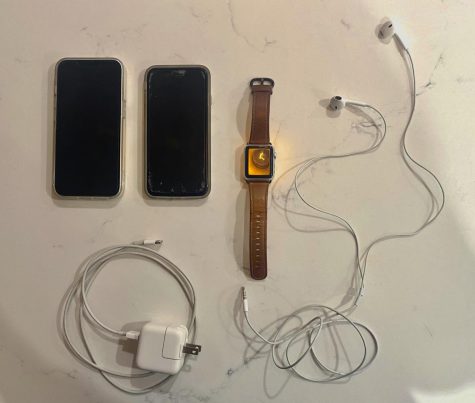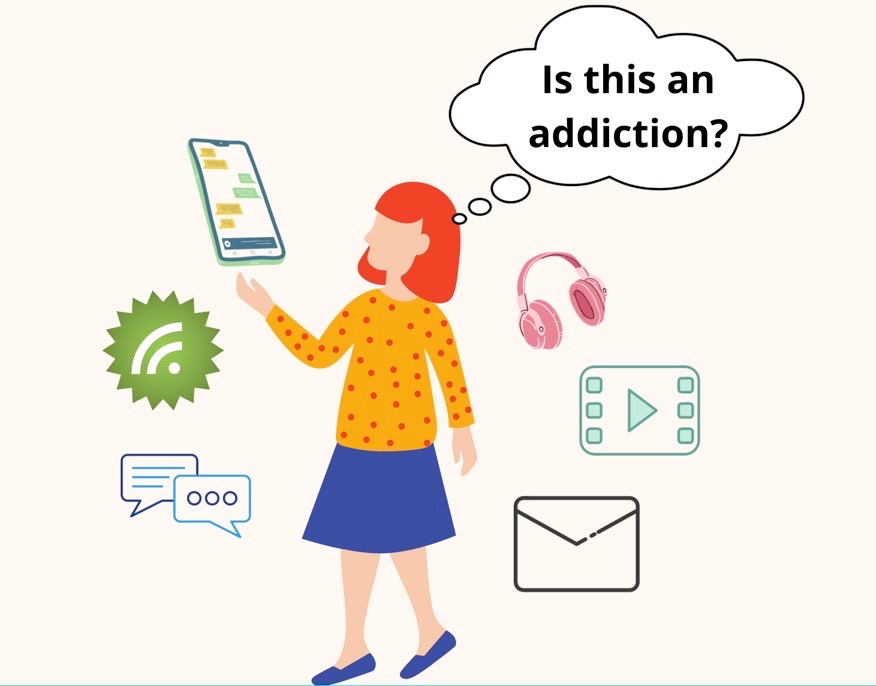Opinion: Addiction is the wrong word
“Addiction doesn’t seem like the proper word to me, when I am out with friends I don’t touch my phone nearly as much as adults make it out to be,” said Garcia. Graphic by: Ava Mohror
February 17, 2022
When and why did adults start telling teens they are addicted to their phones?
Addiction, as defined by ncbi.nlm.nih.gov, is a, “compulsive physiological need for and use of a habit-forming substance.” A cell phone is not a substance, so one cannot have an addiction towards it. Addiction is categorized as a mental illness, a mental illness roughly 21 million Americans suffer from. So when did it become appropriate for teachers to start telling students they are addicted to their phones?
After over a year of lockdown and because of the COVID-19 pandemic, connecting digitally became most students’ only way to communicate with each other. Phones and other devices during lockdown were the only way to stay in-touch with friends, and being without them would result in almost complete isolation. So yes, phones became a substitute to fill in for the loneliness felt when being unable to connect in-person with friends.
Coming back to school post-pandemic, phones have a greater importance than they did pre-pandemic. Teachers have no doubt noticed this, but is it valid for them to call students “addicted” to their phones? I don’t think so.
“When teachers say all students are addicted to their phone, I feel like they are using the wrong term. I don’t think it’s the phone itself students or addicted to, I think it is the idea of having all your friends and socialization easily accessible without having the inconvenience of having to go to each and every one,” said junior Kendall Garcia.

A student will go on their phone during class to check messages and respond to their friends/family. Or, if a class is not engaging and a student feels bored, they will resort to their phone to entertain them. This is a direct reflection on the teacher of that class and poor teaching methods and shouldn’t be justified by claiming students are “addicted” to their phones.
Junior Reece Pickett said, “I do not think that ‘addiction’ is the proper way to describe a teenager using a phone [. . .] cell phones are a common necessity and most people use them when they need to.”
If a student chose to read a book rather than go on their phone in class, a teacher would see them as an eager reader, not addicted to books. I have personally been in class when a teacher told one student to put their phone away but didn’t say anything about another student reading a book.
The term “addiction” being used to describe teenagers’ relationship with their phones has become an inaccurate habit for teachers. It is hard in an age of technology for a young adult not to have a strong relationship with their phone, but that relationship should not be compared to an addiction.
“I don’t think ‘addiction’ would apply to most cases,” said Pickett.








![Lindsay Guzik, new assistant principal said, "I am settling in [at VHS] pretty well. I know a lot of the students, so that makes it a little bit easier coming from Cabrillo, and it's been nice to see them all grown up." Photo by: Abraham Kassa](https://thecougarpress.org/wp-content/uploads/2025/09/IMG_9728-300x200.jpg)
